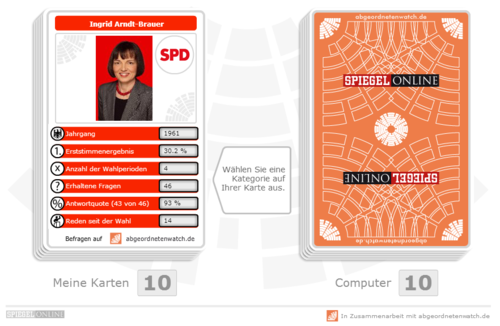How do PMOs stimulate constructive citizen-MP engagement online? This was the main question (of several) that a group of PMOs took up at #PDFPoland last weekend thanks to the Personal Democracy Forum and our gracious hosts at ePF.
In this post, we’ll focus on good practices identified for getting citizens to engage in parliamentary work online. In a couple days we can turn to effective practices for encouraging MP participation. Our discussants included:
- Jerry Weyer of Politikercheck.lu (Luxembourg), representing the ParliamentWatch posse.
- Iveta Kazoka of Providus.lv (Latvia), who focussed on their e-communication platform (but has also worked on an idea crowdsourcing platform and a popular Latvian e-petition website).
- Alina Ostling of the European University Institute, who has authored this paper on PMO websites.
Here are 7 points - along with a number of practical ideas and tools - that were discussed:
1. Timing matters: Citizens are more likely to be engaged as they ponder which candidate(s) will receive their vote(s). Rolling out voter-advice tools during the pre-election period can help drive engagement, as can bringing hot issues to your website’s homepage.
2. Convenience is key: The added value of PMO websites is typically that they make participation easier; whether by enhancing access to information or analysis, or even MPs themselves. MP communication websites reduce barriers to engagement by allowing citizens to address a question to their MP by clicking “send.” One way that Providus has sought to make it even easier for citizens to contact their MP is by developing a widget that can be embedded at the end of a blog or article on another website that allows citizens to pose questions to their MP that are automatically sent to the MP and posted on the MP communication website.
3. Gamification: Everyone likes games. Giving citizens points for participating and acknowledging the most active website users can stimulate competition and provide reasons (such as fun) beyond political concern or frustration to participate. For instance, Providus gives “Diplomas” to citizens who enhance political engagement.

4. Understanding why citizens engage: Meeting citizens’ expectations for use of PMO websites is important to attracting repeat users. Ostling identified some reasons citizens use PMO websites, including: they receive answers from MPs; they believe PMO information to be trustworthy and neutral; they desire to build support for their priorities/beliefs. As Paul Lenz of mySociety noted in a panel the previous day, citizen engagement is only worthwhile if they get something back.
5. Using social media: Social media can help drive website trafffic. Of the 100,000 visitors per month to CRTA (Serbia) websites, including their popular truth-o-meter and recently launched Open Parliament site, 15-20% if traffic is driven by social media, including Facebook, Twitter and YouTube.
6. Targeting potential users: One of the most interesting outcomes of Ostling’s research of TheyWorkForYou, NosDeputes, and OpenParlamento is that the vast majority of the audiences of these websites are men. Although it’s not entirely clear why women are not participating with the same gusto as their male counterparts, women represent a great opportunity for increasing the reach of PMO websites (at least in these countries). Developing partnerships and enhancing outreach to organizations that help drive women’s participation is one potential solution.
7. Forging partnerships: A PMO’s ability to drive engagement on its communication website is enhanced by the partnerships it forges with other stakeholders. Marsad, a ParliamentWatch website, has developed partnerships with a variety of journalists. ParliamentWatch partners with Spiegel Online, making the PMO’s data available directly to users of the media outlet’s website, as well as with lawyers who have helped website users contribute to an anti-corruption law. Partners may include other civil society organizations, the media, or even MPs themselves. Regardless, “getting partners” can be a valuable proposition.


